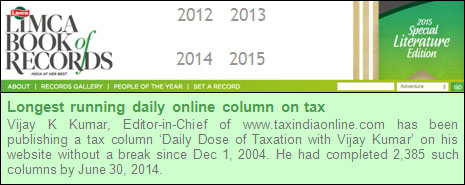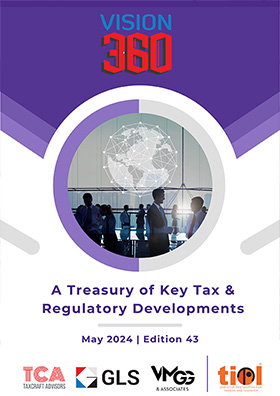 TIOL-DDT 2820 TIOL-DDT 2820
05 04 2016
Tuesday
SERVICE Tax on lawyers is a tricky proposal. When asked why Service Tax was not imposed on lawyers, Chidambaram asked, "which lawyer provides service?" His successor Pranab Babu held PC in high esteem but disagreed with him and had introduced a tax on the Legal Fraternity without naming either Lawyer or Advocate.
Lawyers have gone on strike in several parts of the country and also did what they know best - petitioned the courts. Though Chidambaram's retort was taken as a joke, he was actually stating a solemn truth. Lawyers are officers of the court and their duty is to assist the court; so this service of assisting the court cannot be really taxed.
Several High Courts have stayed the Service Tax on lawyers, but the Bombay High Court took a different view and upheld the levy of Service Tax. While upholding the levy - 2014-TIOL-2279-HC-MUM-ST, the High Court observed,
Profession is noble but the professional is not necessarily so.
Though lawyers are liable to pay Service Tax, it is the clients who pay the tax under the Reverse Charge Mechanism. In the Budget 2016, it was proposed to withdraw the exemption in respect of Services provided by a senior advocate to an advocate or partnership firm of advocates. And the senior advocates are now required to pay the taxes themselves under the forward charge system. The Government issued the following Notifications dated 1.3.2016:
1. Notification No. 9/2016-ST – excluding the senior advocate from the exemption available to advocates in Notification No. 25/2012-ST.
2. Notification No. 18/2016-ST – excluding the senior advocate from the reverse charge mechanism in Notification No.30/2012-ST.
3. Notification No. 19/2016-ST – excluding the senior advocate from the reverse charge mechanism in the Service Tax Rules.
These provisions came into force from 1.4.2016, which means that Senior Advocates are required to take registration, pay the Service Tax, file returns and be ready for all compliance complications. Many a Senior Advocate is worried, not so much at the tax, but at the ordeal of compliance.
At least three High Courts have stayed the tax on the senior advocates.
In the Calcutta High Court, the petitioner Senior Advocate complained that though the Finance Bill, 2016 has not yet been passed and proposals are contained in such bill to alter the position pertaining to Senior Advocates, the impugned notifications seek to bring in the changes with effect from April 1, 2016 without affording the Parliament an opportunity to discuss the matters covered by the Finance Bill.
The learned senior advocate has erred here. It is not correct to say that the proposals to tax senior advocates is contained in the Finance Bill and the tax is made effective from 1st April without affording the Parliament an opportunity to discuss the matters covered by the Finance Bill.
There is nothing in the Finance Bill about taxing senior advocates – it is only by a few notifications and Parliament may not discuss this at all.
Anyway, the High Court found that prima facie it appears that the changes sought to be brought about may unreasonably prejudice Senior Advocates. So the High Court stayed the impugned notifications bearing nos.9/2016, 18/2016 and 19/2016, all dated March 1, 2016 insofar as such notifications pertain to the levy of service tax on Senior Advocates.
In the Delhi High Court, the Court was shown a copy of the order of the Gujarat High Court on the same issue. In light of the said order, and with a view to maintaining consistency, the Delhi High Court also stayed the above mentioned notifications and directed the Revenue to to continue the reverse charge mechanism for payment of service tax for Senior Advocates under Notification No.30/2012-ST.
Now, should each High Court stay these provisions? Can't we take the issue to the Supreme Court?
Why Senior Advocates?: The whole problem is because of the system of having designated senior advocates. Why should we have some lawyers designated as senior advocates through a long drawn out process? When we don't have designated senior doctors, engineers, accountants, what is the great need for senior advocates?
Please see 2016-TIOL-675-HC-KOL-ST for the Calcutta High Court order
Low Value Capital Goods as Inputs - Beneficial or baneful?
A major textile manufacturer writes in:
We are a Composite Textile manufacturer.
At Present, we have opted simultaneous availment of Notification No. 30/2004-CE dt.09.07.2004 for clearance of finished goods under Nil Rate of duty & concessional Rate of Duty under Notification No. 7/2012-CE or Tariff rate.
We are not availing CENVAT Credit on Inputs and Input Services as per the condition of Notification No.30/2004-CE.
We avail CENVAT Credit on Capital goods/ Spares part and as per CENVAT credit Rules Rule 4 (2)(a), 50% of Capital Goods CENVAT credit is eligible in first year of receipt and remaining 50% will be eligible in subsequent year/years.
In the Budget-2016,vide Notification No.13/2016-CE(N.T) dated 01.03.2016 w.e.f.01.04.2016 the following clause (v) has been inserted in Rule 2 (k) definition of inputs under CENVAT Credit Rules Rules,2004.
“(v) all capital goods which have value upto ten thousand rupees per piece”
In terms of above amendment,Capital Goods up to value of Rs. 10000/- has been included in the definition of Inputs and a manufacturer can avail full credit in the first year itself instead of keeping 50% for remaining FY under Capital goods definition.
The intention of above changes in the definition of Inputs is to have full CENVAT credit of capital goods upto Rs. 10000/- in the same year of receipt.
However, this change is a major setback for Textile Industries who opted both notification simultaneously. Therefore, availment of CENVAT Credit as per above amendment would be violation of condition of Notification no. 30/2004-CE.
In view of the above, we request you to highlight the issue for better clarifications providing option of availing of such CENVAT credit under both capital goods and Inputs definition.
The Budget Notification No. 13/2016-CE(NT), dated 1.3.2016 also stipulates that input excludes capital goods except when, the value of such capital goods is upto ten thousand rupees per piece.
This would mean that capital goods valued at less than ten thousand rupees will remain as capital goods even though they are deemed inputs now. But this provision is confusingly drafted that even a major textile manufacturer is not sure and wants a clarification from the Government. And such an element of doubt is enough for Show Cause Notices to start flying around.
The Board should immediately clarify that the low value capital goods will be both capital goods and inputs as per the choice of the assessee, lest the boon given by the Board should not end as a bane.
Central Excise - No Recovery of Refund under Section 11A without Review Under Section 35E
AN erroneously refunded duty can be recovered under Section 11A of the Central Excise Act, but can such recovery be made without challenging the refund order? It should be simple logic that an Assistant Commissioner who passed a refund order himself cannot say that his order was erroneous and so he is demanding the erroneously granted refund. Even if the refund order was passed by another Assistant Commissioner, he cannot sit in judgement over an order passed by another Assistant Commissioner.
But litigation in Central Excise is not all that simple.
In an order delivered on 19.9.2007, the CESTAT held that recovery of erroneous refund can be made without review under Section 35E. - 2008-TIOL-42-CESTAT-MAD.
Recently, the Madras High Court allowed the appeal against the above order in which the question of law considered was,
"Whether there can be a demand notice under Section 11A of the Central Excise Act, 1944 by the Original Authority for alleged erroneous refund (earlier granted by the same Original Authority) without reviewing at all the refund order of the Original Authority by the Superior Authority in terms of Section 35E of the Act ibid?"
Please see Breaking News for details of the case
Swift Clearance - Not Really!
WE received this note from Mr. BV Kumar, a former Member of the CBEC.
“I am enclosing a small note, which is based on a very recent experience in one of the Custom Houses. It is also sad to note that most of the staff don't come to the offices till 11AM and the outward procession starts from 4PM. This is the state of affairs, which one can see by a casual visit to any of the Central Govt. Offices.
I saw an advertisement in the leading newspapers dated 31.3.2016 regarding “Swift clearances” which would be implemented with effect from 1st April 2016.
In one of the Customs houses where machinery for a project was imported under Project Import Regulations, the BCD applicable was 5% and there was no dispute in this regard. However, for determining the CVD, the Appraiser was of the view that every machine (assembly or sub-assembly) is required to be assessed on merits.
We met the Principal Commissioner of Customs to convince that the machinery which was imported has been specifically manufactured by the overseas supplier, for producing a particular product and on that basis the classification of the goods is required to be determined for applying the CVD rate duty.
The Principal Commissioner of Customs was of the opinion that the rate of duty applicable for CVD should be as proposed by the Appraiser. He also advised that in order to expedite the clearance it is better to pay the CVD in full rather than resort to provisional assessment under the Customs (Provisional Duty Assessment) Regulations, 1963.
Not to delay the implementation of the project it was decided by the importers to pay the CVD as determined by the Appraiser. Accordingly, the CVD was paid immediately.
Surprisingly the Bills of Entry were being tossed from the SIIB to the Group concerned and from there to the Project Import Group. The Deputy Commissioner concerned was not in the seat most of the time and it took nearly 10 days to clear the consignment.
The result is additional expenditure on warehousing charges, container's rent to be paid in foreign exchange, demurrages and delay in implementation of the project resulting in escalation in interest costs on borrowings, delay in production of goods, and frustration of the importers. I wonder, is the government really serious, in implementing their slogans: ”ease of doing business”, minimum government and maximum governance”, etc.
It is fine to advertise in the papers about swift clearances but the real proof is in its implementation.
It is high time Rule 56 J is implemented to compulsory retire those officers who are known to be corrupt or inefficient and cannot measure up to their responsibilities to meet the policy objectives of the government”.
In the case of a major project, the import of the machinery required for setting up of the plant may take more than one or two years since machinery is not available off the shelf and is fabricated after receiving a specific order and after entering into a contract with the overseas suppliers. Even in such cases, the electronics, the boilers, the internal combustion engines, conveyor belts, and other specialized equipment, etc are outsourced from different specialist manufactures and supplied to the project by an overseas supplier on a turnkey basis.
In such cases to determine the CVD applicable it would take enormous amount of time to examine each machine (Assembly or Sub-Assembly) to determine their classification.
In order to facilitate quick clearance and assessment, a separate classification under the Central Excise Tariff Act, on the same lines of Heading 9801 of the Customs Tariff Act, 1975 is required to be notified. It is high time this is implemented so that this would facilitate clearance of goods imported under Project Import Regulations.”
Until Tomorrow with more DDT
Have a nice day.
Mail your comments to vijaywrite@tiol.in |









 Download PDF
Download PDF




